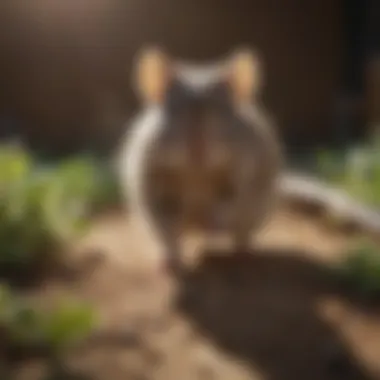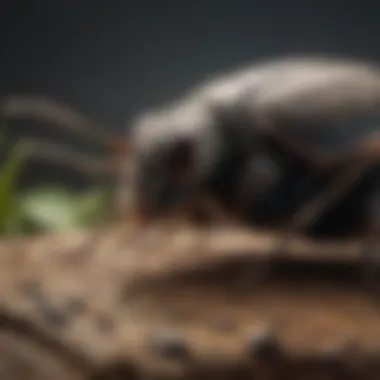Harnessing the Power of Peppermint Oil for Effective Pest Control Solutions


DIY Pest Control Techniques
Implementing DIY pest control techniques empowers homeowners to address pest issues promptly and effectively. Homemade pest control solutions using common household items like vinegar, baking soda, and essential oils offer eco-friendly alternatives to chemical treatments. Mixing these ingredients to create sprays, powders, or traps can target pests like ants, flies, and spiders without harsh chemicals.
Using essential oils for pest control provides a natural and aromatic way to repel pests from your home. Essential oils like lavender, eucalyptus, and tea tree oil have insect-repellent properties that can be diffused, sprayed, or applied topically to deter pests. Creating a bug-free environment at home involves strategic placement of essential oil diffusers and regular maintenance of repellent barriers.
Employing effective pest traps and barriers enhances DIY pest control efforts. Setting up traps for mice, fleas, or pantry moths in areas of high activity can help reduce pest populations indoors. Installing barriers like door sweeps, window screens, and exclusion strips prevents pests from entering your living spaces.
Choosing reputable pest control brands can provide homeowners with reliable products and solutions for managing pest issues. Trusted brands offer a range of pest control products from traps and baits to repellents and disinfectants. Safeguarding your home with effective pest control measures ensures a safe and pest-free living environment for you and your family.
Exploring miscellaneous DIY pest control techniques enables homeowners to tackle unique pest challenges creatively. From building homemade spider catchers to using natural predator urine as a deterrent, innovative DIY methods can complement traditional pest control approaches and offer personalized solutions to specific pest problems.
Introduction to Peppermint Oil
Peppermint oil stands out as a versatile and potent natural remedy that plays a vital role in pest control practices. In this comprehensive guide, we delve into the various facets of utilizing peppermint oil for pest management purposes. From understanding its origins and composition to exploring its distinctive characteristics and invigorating aroma, peppermint oil emerges as a compelling solution for tackling pest infestations.
Understanding Peppermint Oil
Origin and Composition:
Peppermint oil derives its essence from a meticulous extraction process involving the peppermint plant. The composition of this oil boasts a harmonious blend of menthol and menthone, contributing to its efficacy as a pest repellent. The organic origin of peppermint oil makes it a sought-after choice for eco-conscious individuals looking to embrace natural alternatives for pest control. Despite some slightly sEsporgenous variability due to cultivation methods, the core composition of peppermint oil remains consistent in offering unparalleled benefits in pest management initiatives.
Characteristics and Aroma:
The defining characteristic of peppermint oil lies in its refreshing mentholated scent, which not only serves as a natural air freshener but also acts as a powerful deterrent for pests. The aromatic profile of peppermint oil creates an unwelcoming environment for insects and rodents, making it a preferred choice for those seeking to repel pests naturally. While the strong aroma of peppermint oil may not appeal to all individuals, its potency and effectiveness in pest control applications remain undisputed, making it a valuable asset for maintaining a pest-free environment.
Benefits of Peppermint Oil for Pest Control


Non-Toxic Nature:
One of the standout attributes of peppermint oil is its non-toxic nature, making it a safe and environmentally friendly option for pest management. Unlike chemical-laden alternatives, peppermint oil poses no harm to humans, pets, or the ecosystem, ensuring guilt-free pest control practices. Its non-toxic formulation also makes it suitable for indoor use, providing a safe solution for households with children and pets.
Versatility in Pest Repellent:
Peppermint oil's versatility shines through its ability to repel a wide range of pests, including ants, spiders, and mosquitoes. This adaptability makes it a multifunctional pest control agent that caters to diverse pest infestations. Whether used in sprays, diffusers, or soaked cotton balls, peppermint oil proves effective in warding off various pests, demonstrating its flexibility and reliability in pest management applications.
Effective Against Various Pests:
Peppermint oil's efficacy extends beyond its pleasant aroma, as it boasts remarkable effectiveness against an array of pests. From deterring mice in indoor spaces to repelling rats in outdoor environments, peppermint oil emerges as a formidable opponent to common household nuisances. Its ability to target multiple pest species reinforces its reputation as a comprehensive pest control solution, offering homeowners a holistic approach to pest management.
Peppermint Oil as a Natural Pest Repellent
Peppermint oil stands out as a natural pest repellent, offering a myriad of benefits in pest control strategies. The potent aroma and natural properties of peppermint oil make it a valuable tool for addressing pest infestations without resorting to harsh chemicals. Its non-toxic nature sets it apart from traditional pest control methods, promoting environmental friendliness and safety for households. By incorporating peppermint oil, one can explore a sustainable and effective approach to pest management.
Insect Repelling Properties
Repelling Ants
Ants are a prevalent nuisance in many households, but peppermint oil serves as a potent deterrent against these intruders. The key characteristic of peppermint oil in repelling ants lies in its strong scent, which disrupts their pheromone trails. This disruption confuses ants, deterring them from entering specific areas treated with peppermint oil. The unique feature of peppermint oil in repelling ants is its ability to address ant infestations without posing health risks to humans or pets. While effective, it is important to note that the application of peppermint oil may require reapplication to maintain its repellent effect.
Deterring Spiders
Peppermint oil's effectiveness in deterring spiders is a valuable asset in pest control efforts. The key characteristic of peppermint oil against spiders is its arachnophobic properties – spiders are naturally averse to the scent of peppermint oil. This aspect makes it a popular choice for individuals seeking a natural and non-toxic spider repellent. The unique feature of peppermint oil in deterring spiders is its ability to create an inhospitable environment for spiders, discouraging their presence in treated areas. While advantageous, it is essential to apply peppermint oil consistently to ensure the continuous deterrence of spiders.
Keeping Mosquitoes at Bay


When it comes to keeping mosquitoes at bay, peppermint oil proves to be a reliable solution. The key characteristic of peppermint oil in repelling mosquitoes lies in its strong fragrance, which masks the scent of humans and reduces attraction to mosquitoes. This strategic advantage makes peppermint oil a beneficial choice for individuals looking for natural mosquito repellents. The unique feature of peppermint oil in keeping mosquitoes at bay is its non-toxic nature, offering a safe alternative to chemical-laden repellents. Despite its advantages, peppermint oil application for mosquito control may need to be supplemented with other methods in heavily infested areas.
Rodent Deterrent
Effectiveness Against Mice
Peppermint oil's effectiveness against mice is a notable aspect of its role as a rodent deterrent. The key characteristic of peppermint oil in repelling mice is its intense scent, which interferes with their navigation and communication abilities. This disruption confuses mice, deterring them from inhabiting areas treated with peppermint oil. The unique feature of peppermint oil in repelling mice is its non-toxic formulation, offering a humane approach to mouse control. While beneficial, consistent reapplication of peppermint oil may be necessary to maintain its repellent effects against mice.
Repelling Rats
In the realm of rat control, peppermint oil emerges as a potent repellent against these larger rodents. The key characteristic of peppermint oil in repelling rats is its strong scent, which creates an unfavorable environment for rats. This aspect makes peppermint oil a popular choice for individuals seeking natural and low-risk methods for rat deterrence. The unique feature of peppermint oil in repelling rats is its versatility, as it can be easily applied in various settings to discourage rat activity. However, it is essential to note that while peppermint oil is effective, addressing large-scale rat infestations may require additional pest control measures in conjunction with peppermint oil application.
Application and Usage of Peppermint Oil for Pest Control
Peppermint oil stands out as a versatile and potent tool in managing pest infestations. Its application and usage play a pivotal role in ensuring effective pest control measures. By understanding how to correctly apply peppermint oil, individuals can harness its natural properties to combat various pests successfully. Whether dealing with indoor or outdoor pest issues, the proper utilization of peppermint oil can yield remarkable results.
Indoor Pest Management
Sprays and Solutions
Sprays and solutions infused with peppermint oil serve as key components in indoor pest management. The potent aroma of peppermint acts as a natural deterrent, repelling pests effectively. A notable characteristic of sprays and solutions is their non-toxic nature, making them a safe choice for households. The convenience of application further enhances their appeal, as these products can be easily sprayed in areas prone to pest activity. While sprays and solutions offer a practical solution for controlling pests indoors, it is essential to consider the frequency of application to maintain their effectiveness.
Diffusers and Vaporizers
Integrating diffusers and vaporizers into indoor pest control strategies provides a continuous release of peppermint oil into the air. This consistent diffusion helps create an inhospitable environment for pests, deterring them from inhabiting the space. The key characteristic of diffusers and vaporizers lies in their ability to cover larger areas compared to spot treatments with sprays. While offering a convenient and hassle-free approach to pest management, diffusers and vaporizers may require periodic refilling to sustain their efficacy.
Soaking Cotton Balls


Soaking cotton balls in peppermint oil offers a targeted solution for addressing specific pest issues in indoor environments. Placing these oil-infused cotton balls strategically near entry points or pest hotspots can effectively repel insects and rodents. A unique feature of this method is its flexibility, allowing homeowners to adjust the number of cotton balls based on the severity of the infestation. While cost-effective and easy to implement, it is important to monitor the condition of the cotton balls regularly to ensure the consistent release of peppermint oil.
Outdoor Pest Control
Garden and Yard Applications
Utilizing peppermint oil in garden and yard applications presents a natural and eco-friendly approach to pest control. The key characteristic of this method is its compatibility with plants and outdoor environments, ensuring minimal impact on the ecosystem. By incorporating peppermint oil into sprays or watering solutions, individuals can protect their garden from various pests while promoting plant health. While garden and yard applications offer a sustainable pest management solution, it is advisable to reapply the oil after heavy rainfall to maintain its effectiveness.
Perimeter Protection
Establishing a perimeter of peppermint oil around outdoor spaces serves as a proactive measure against pest intrusions. The key characteristic of perimeter protection is its ability to create a barrier that deters pests from entering the premises. This method is particularly beneficial for repelling insects and small rodents from dwelling near residential areas. While offering a natural and low-maintenance pest control solution, it is important to regularly inspect and replenish the oil barrier to ensure continuous protection.
Considerations and Best Practices
In the realm of Utilizing Peppermint Oil for Pest Control, the segment on Considerations and Best Practices assumes a paramount position. This section acts as a crucial repository of essential knowledge and guidelines for individuals seeking to harness the prowess of peppermint oil against pest invasions. Understanding and adhering to the stipulated Considerations and Best Practices are key factors in ensuring the efficacy and safety of peppermint oil applications. Emphasizing safety precautions, storage requirements, and usage guidelines, this segment serves as a cornerstone for a successful pest management strategy utilizing peppermint oil. By acquainting oneself with these prudent practices, individuals can optimize the outcomes of their pest control endeavors while safeguarding their well-being and that of their environment.
Safety Precautions
Dilution Guidelines
When it comes to Dilution Guidelines, precision and accuracy are indispensable facets to bear in mind. Diluting peppermint oil correctly not only enhances its efficacy but also mitigates the risk of any adverse reactions due to concentrated applications. The key characteristic of Dilution Guidelines lies in their ability to maintain a delicate balance between potency and safety. By adhering to recommended dilution ratios, individuals can harness the full potential of peppermint oil in pest control without compromising on safety standards. The unique feature of Dilution Guidelines is their adaptability, allowing users to tailor the concentration of peppermint oil based on specific pest control needs and sensitivities. While following Dilution Guidelines may require meticulous attention to detail, the benefits of achieving optimal dilution levels far outweigh the potential drawbacks, making it a prudent choice for maximizing the effectiveness of peppermint oil in pest control applications.
Avoiding Contact with Pets
In the context of pest control strategies involving peppermint oil, Avoiding Contact with Pets emerges as a critical aspect to consider. Pets, with their curious nature and tendency to explore their surroundings, may inadvertently come into contact with peppermint oil if precautions are not diligently observed. The key characteristic of Avoiding Contact with Pets is its proactive approach to safeguarding the well-being of household animals from potential irritants or toxins present in undiluted peppermint oil. By adopting measures to restrict pet access to treated areas or ensuring meticulous cleanup post-application, individuals can prevent accidental pet exposure to peppermint oil. The unique feature of Avoiding Contact with Pets lies in its role in promoting a safe and harmonious cohabitation environment for both humans and their furry companions. While implementing strategies to Avoid Contact with Pets may require additional effort and vigilance, the advantages of maintaining a pet-friendly pest control approach underscore its significance in the overarching goal of holistic pest management using peppermint oil.
Storage and Shelf Life
Proper Storage Conditions
Proper Storage Conditions represent a pivotal aspect in the longevity and effectiveness of peppermint oil for pest control applications. The meticulous adherence to appropriate storage practices ensures the preservation of peppermint oil's potency and aroma, thereby maximizing its utility in pest management endeavors. The key characteristic of Proper Storage Conditions lies in their role in shielding peppermint oil from degradative factors such as light exposure, heat, and air, all of which can compromise its quality over time. By storing peppermint oil in dark, airtight containers in cool environments, individuals can extend its shelf life and maintain its efficacy against pests. The unique feature of Proper Storage Conditions is their capacity to prolong the freshness and integrity of peppermint oil, safeguarding its inherent properties for extended periods. While implementing Proper Storage Conditions may require initial organization and investment in suitable storage vessels, the benefits of ensuring peak peppermint oil quality justify the efforts put into maintaining optimal storage conditions.
Maintaining Potency
Maintaining Potency stands as a central tenet in the effective utilization of peppermint oil for pest control initiatives. The conscientious preservation of peppermint oil's potency guarantees consistent and reliable results in repelling pests across different applications. The key characteristic of Maintaining Potency lies in its focus on preventing degradation and volatilization of the active compounds within peppermint oil that confer its pest-repellent properties. By implementing storage practices that minimize exposure to external elements and regular assessments of peppermint oil quality, individuals can uphold its potency over time. The unique feature of Maintaining Potency is its role in sustaining the efficacy of peppermint oil, ensuring that it retains its pest control attributes throughout its usage lifespan. While prioritizing the maintenance of peppermint oil's potency may necessitate periodic evaluations and replenishments, the advantages of consistently potent oil formulations underscore its significance in achieving lasting pest control outcomes effectively.



